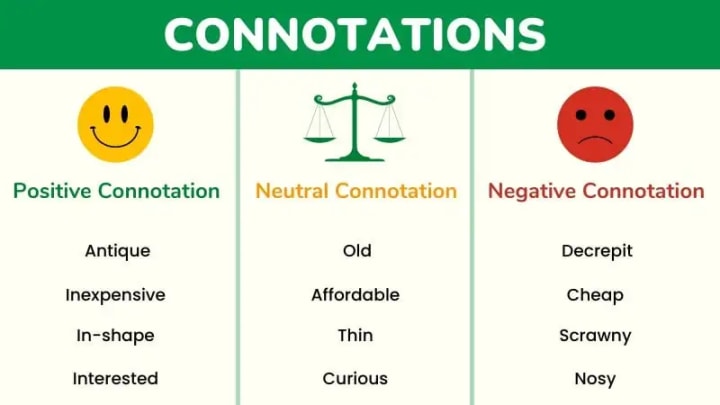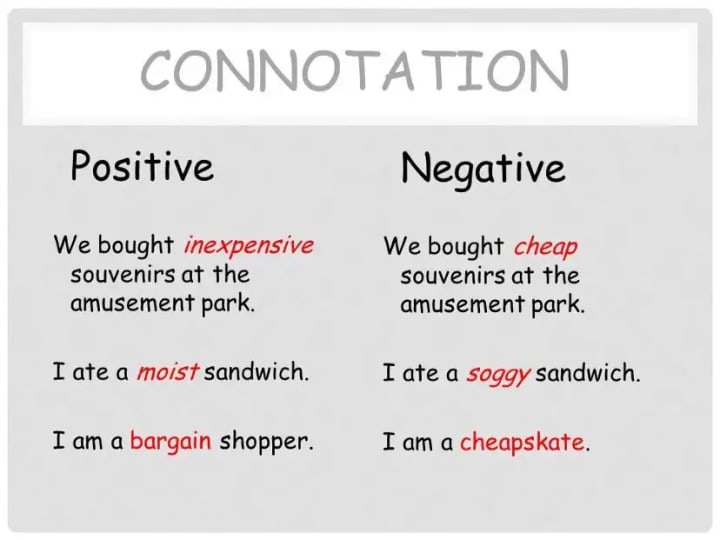The Remarkable Power of Language in Writing
And How to Use It to Your Advantage

On August 28, 1963, Martin Luther King Jr., an American civil rights activist and Baptist minister, delivered a speech so passionate that it was considered the turning point of the Civil Rights Movement.
During that day under the burning sunlight, hundreds of thousands of people gathered around the Lincoln Memorial in Washington DC, each with their own heart dedicated to advocating for the civil and economic rights of African Americans.
Strongly believing that “all men are created equal” and have the same rights and privileges, King delivered his speech, named “I Have a Dream”, before the admiration and passionate enthusiasm of others.

The speech strongly calls for the peaceful union of people of all races to live together in love, but the language aspect of the speech makes it something more than an ordinary speech: a “literary masterpiece".
His rhymic flow of words becomes the legendary music of language, and his vivid imagination brings forth excellent use of extended metaphor.
Along with his brilliant communication skill, King stirs up the audience's passion to rise up “from the dark and desolate valley of segregation” and work together “in the solid rock of brotherhood."
The speech was widely considered “the turning point” of the Civil Right Movement. It helped pass the 1964 Civil Rights Act as well as encouraged and inspired many other movements.

Language is beautiful, in the fact that it helps us better understand ourselves and others. It is the “cultural phenomenon” and the tool where dwelling the abilities to speak and be understood and listen and understand.
From etymology to philology as parts of linguistics, it is worth exploring the importance of the proper use of language as the ultimate tool of expression and communication.
We as new writers tend to forget this aspect of writing. Along with several other mistakes beginning writers make, dull use of language is unavoidable (you can take my writing as an example).
Still, a little change in word choice may transform your writing completely. In his “I Have a Dream” speech, King could have said, “let’s end this segregation and bring up the true racial justice,” but he said this instead:
Now is the time to rise from the dark and desolate valley of segregation to the sunlit path of racial justice.
Do you see the difference? One is general, dull, and less persuasive. The other is strong, passionate, persuasive, and heart-touching. This is an example of how to use literary devices, which are so enriched in this speech that it moves through the hearts of the listeners just like the music you find good in your head the first time you hear it.
And it is not just word choices that make a piece of writing great. The way you understand and utilize words in different contexts and arrangements can help you understand more about your audience and how to convey your message to them more effectively.
#1. Language is Powerful

If you are a poetry lover, you will notice that many professional poets know how to “paint the blank canvas” inside a reader’s imagination, that is, to use proper words and combine multiple poetic devices such as imagery to bring up a vivid image inside the reader’s mind.
This is a strong example of the power of language since, with just written words on paper, a poet can create or stir up emotional feelings inside the reader’s heart.
Words are incredibly powerful since they effortlessly bring an object, action, or thought into our imagination. Take a look at the list of random words Sara Maitland gives in her book The Writer’s Way on page 54:
“Chair
Home
Tree
Apple
Diamond
Slonery
Pencil”
As you follow along the list, you certainly would find it impossible to not have some thoughts, feelings, or images centered around the words. What is more interesting is that you may have given the word “slonery” some meaning based on your feeling or experience even though Maitland made up that word.
The same happens with abstract words such as love, kindness, or walking. They magically bring the object or action associated with them into your mind without any effort.
When particular words are there, therefore, it is almost impossible for your mind not to convert them into something recognizable, even if the words don’t indicate a real object.

Now, let’s get back to the old day and play a game. Try not to think of a “pink elephant” while sitting for one minute. When a weird pink elephant appears in your head, slam something, if properly, around you.
If you tried really hard to resist your mind thinking about a ‘pink elephant’, it might get more and more difficult to not think about it again. That is why words are powerful, and knowing how to utilize them gets you off to a good start on your writing journey.
- How to improve your skill in choosing the right words?
Reading will be the ultimate tool in helping improve your writing skill. In one of my articles posted on Medium, “5 Basic Equipment Every Beginning Writer Should Have For Their Writing”, I strongly emphasized the importance of reading in using your language:
Reading constructs the foundation on which your writing career blossoms. It is the most powerful tool to help you exploit and convert their imagination into words, just like babies who need an environment where a lot of language dwells to develop their mother tongue.
As shown in some research, some effects of reading include improving “brain connectivity” and, most importantly, flourishing your vocabulary comprehension as well as your creativity and writing efficiency.
#2. “Words tend to carry with them a sort of ‘aura’ or atmosphere” (Maitland, 67)
Words that are carefully chosen can strongly impact the reader’s feelings in different situations even if they mean a similar thing. Take a look at this picture below:

Read each row of words from left to right. Notice how similar the words in each row are compared to each other, yet they somehow evoke a different feeling if you read carefully.
This is called ‘Connotation’, which refers to a particular idea or feeling that a word “invokes” besides its literal meaning. We may have come across many different situations where we misuse or see others misuse certain words in different settings.
For example, you may call your parents “Mommy” and “Daddy” when you are at home speaking to them, but you may say “my mother” or “my father” when speaking to others about them.
These words have the same clear meaning, but they belong to different levels of language usage, or registers, that we are able to make a distinction between as we grow up.
So, why do word effects matter in writing? Different words give the audience a different feeling, even if the literal meaning is the same, so choosing words when you write can either be very effective in captivating the readers’ attention in your word flow or make the entire paragraph collapse. Take a look at this picture:

Notice how these red-colored words alter the atmosphere in these three situations simply just by replacing themselves with other words that differ in connotation.
“Bargain” can mean “good buy”, while “cheapskate” means that someone is stingy, which gives the reader different feelings about the subject the sentences are about. In novels, the way you use words indicating different contexts also affects character development.
- How to enhance your sense of a variety of a language?
One effective way that beginners can become sensitive to what certain words may be suggesting to the readers is by reading — of course — listening to others talking in different settings, and creating multiple personalities of yourself, which can help you stay unbiased and without too much self-consciousness when reading something.
On page 70, Maitland shares an exercise called “Experiment with Atmosphere”, which I find very simple, efficient, and pretty effective. The exercise can be summarized into 3 different steps:
- S1 — You’ll need something to read that has a straightforward narrative, like a report from a local newspaper. Read and mark what happened and the language and style the journalist is using.
- S2 — Rewrite the story from a different point of view, like the reaction of a bystander like a child or someone whose friend is involved in the described event. Write in the first person and try to make it quick and not longer than the original story.
- S3 — Now, you can redo the exercise with different characters, settings, contexts, and points of view.
#3. Words have rhythms in them.
Back in the old days during my middle school years, I didn’t read a lot because of the “nonsense” and boring texts that I was told to read over and over again to answer given following questions, but it is not the only reason that brought me back to that time.
The complex sentence and grammatical structures as well as the punctuations were too exhausting for me to understand.
But it was not the case during the third century CE (Jan 1, 201 AD — Dec 31, 300 AD) when there was even no punctuation in written texts. Because humans can only speak when we are breathing out, reading such a text with no punctuation mark accidentally create “a rhythm” when reading out loud.
The same thing can be found in songs and poetry where there may be no punctuation marks. Therefore, these pieces of writing can better evoke emotional and dynamic feelings within words.
While punctuation marks were then invented to replace the “breathing rhythm” and guide the reader to follow the sentence structure, punctuations in songs and poetry seem to remain optional.
In poetry with no punctuation, a poet considers line breaks or other uses of white space to create rhythm; in songs, either with or without punctuations, the pleasurable music, consisting of beats created by drums or other melodic elements, releases the neurotransmitters associated with reward.
For such reason, songs and poetry can stick more easily in our memories in various ways than chunks of prose do.
“Rhythm affects mood and pace and our relationships with those around us” (Maitland, 74). Knowing how to create stimulating rhythms is one of the most effective strategies to hook the reader along and convey the main message a writing piece is about.
To clarify what I mean, read carefully these two poems and slowly feel the rhythm between each line:

It is simple enough to see that this poem is about someone who goes by Lochinvar and makes a journey “out of the west”. Notice how the words at the end of each line break rhyme with those on the next line.
Scott’s brilliant uses of line break technique, word choice, and punctuation imitate the movement the poet is describing. If you transform this poem into prose, you can find the same effect but less rhythmic, but it also depends on the way you choose words and utilize rhythm.
Lochinvar came out of the west. His horse was the best in the land. He had no weapons except for his broadsword. He rode in his horse unarmed and alone. He was faithful and dauntless. There was never a knight as brave as Lochinvar.
Despite the fact that rhythm is less evident in prose, it is just as important, and many excellent writers use it to vividly capture a variety of moods and, basically, keep the reader paying attention, and hook them along. Take a look at this passage by Emma Jane Austen:
“…The best fruit in England — every body’s favourite — always wholesome. — These the finest beds and finest sorts. — Delightful to gather for one’s self — the only way of really enjoying them. — Morning decidedly the best time — never tired — every sort good — hautboy infinitely superior — no comparison — the others hardly eatable — hautboys very scarce — Chili preferred — white wood finest flavour of all — price of strawberries in London — abundance about Bristol — Maple Grove — cultivation — beds when to be renewed — gardeners thinking exactly different — no general rule — gardeners never to be put out of their way — delicious fruit — only too rich to be eaten much of — inferior to cherries — currants more refreshing — only objection to gathering strawberries the stooping — glaring sun — tired to death — could bear it no longer — must go and sit in the shade.”
Notice how the rhythm in the passage enhances the background meaning of the words.
The repeated patterns of words or sounds may be less strong than those in poetry, but the author’s utilized the repetitions, grammar, and semantic structure, and sentence length to create the rhythm to its fullest effect.
Therefore, the passage fully captures the increasing exhaustion of a woman who is picking up strawberries under the sun by using the rhythm of the human breath.
- How to develop an authentic and style-rich voice to enhance your use of rhythm in writing?
Reading out loud is considered the best way to get better at this skill. Since you’re able to hear your own work, you will pay attention not just to your work but also to your voice and reading style, which is essential in building a strong and “authentic” voice.
Furthermore, reading out loud can become a great editing tool for your writing. You may proofread through your story and easily miss an obvious mistake, but you can notice quickly any grammatical error or poor word choice in a sentence when reading out loud since it gives you a feeling of something that is not right. To do this, you should:
#1. Find a quiet place
#2. Close your eyes and imagine a listener or a group of people a few feet away from you.
#3. Find something that you enjoy reading and that has a dynamic and rich rhythmic aspect in them. Psalms (rhythmic prose) or blank-verse poetry is recommended. Read it slowly and loudly enough so that the people you are imagining reading to and for can hear you clearly.
#4. Have a voice recording tool with you and record what you read. Listen to the texture of the whole piece of writing instead of the meaning of the words and try to read it differently the next time with a different voice, style (emotionally), or arrhythmic effects.
#5. You can choose to read your own work. You may get to make changes to it to make your writing more interesting and catchy.

‘When all the drowsy metaphors
about women and fruit
have been peeled
devoured;
there’s just you, me
a bowl full of summer peaches,
two parentheses
with nothing in between
(just space)
for the tongue’s imagination’
Poem by Chaia Heller
***
Read more stories like this from me on Medium
:)
About the Creator
ArtisKev N.
A writer, pianist, and artist to be. I write about writing advice, my personal life, and my opinions on different topics. Support me: https://rb.gy/ym5py






Comments
There are no comments for this story
Be the first to respond and start the conversation.